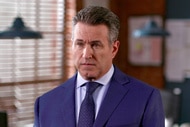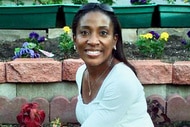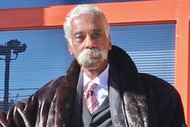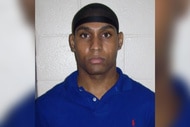Create a free profile to get unlimited access to exclusive videos, breaking news, sweepstakes, and more!
Ex-Employee Of Elizabeth Holmes Recalls How Her Dream Job Turned Into A ‘Nightmare’
“Every day, you are just challenging yourself like ‘This is wrong. I feel sick, like I can’t do this,'" former employee Erika Cheung said of realizing Elizabeth Holmes' startup Theranos was providing inaccurate blood test results.

Former Theranos scientist Erika Cheung admits she was “star-struck” by Elizabeth Holmes the first time she met the company’s founder during a job interview, but said the dream job quickly turned into a “nightmare.”
Cheung suspected employees at the highly-secretive blood testing firm were being spied on at work and said she felt physically ill when she realized the company was lying to investors and patients about the capabilities of its highly-touted technology, which they boasted could perform numerous analyses using just a a few drops of blood.
“It’s incredibly stressful and the fact that you see yourself working for this company that is lying to patients, it’s a nightmare,” Cheung told “American Greed” in its 200th episode airing Wednesday on CNBC at 10 p.m. ET/PT. “Every day, you are just challenging yourself like ‘this is wrong. I feel sick, like I can’t do this.’”
Cheung wasn’t the only one to have harsh words about Theranos and its recently convicted founder. Others who spoke to “American Greed” called Holmes a “zealot” who tried to pin the company’s failings on others and was “putting patient’s lives in jeopardy” by adopting a fake-it-til-you-make-it approach to the failing company.
Joseph Fuisz, a former friend and neighbor of the Holmes family in Washington D.C., described the upper-class Holmes family as being obsessed with what they didn’t have and said by the age of 9, Holmes had already decided she was going to be a billionaire.
“These kids are raised with the idea that even though we live in what most people would think of as a very, nice, upper middle-class way, it’s not good enough,” he said.
It was that drive, he said, that pushed Holmes to be an over-achiever. After graduating high school, Holmes headed to Beijing to study Mandarin as part of Stanford University’s summer program. It was there she met Ramesh “Sunny” Balwani, a software engineer and veteran of Silicon Valley start-ups who was 20 years her senior.
“She was very famous in the Stanford Chinese program because the entire department knew about her Chinese, her skills and so that’s ... when I first met her,” Balwani would later recall in a SEC deposition cited by "American Greed."
Early on, Holmes believed she would become the Thomas Edison of biomedical engineering and once met with Stanford professor Phyllis Gardner, MD, to discuss her idea for a wearable patch that could simultaneously diagnose and treat patients for disease.
“She wanted to make a skin patch and she wanted a sample of blood to test for an infectious disease and then she wanted to deliver antibiotics through the patch,” Gardner recalled to “American Greed.”
Gardner was skeptical of the idea because it would be difficult to get antibiotics through the skin but said Holmes refused to listen to reason.
“I just couldn’t help her,” Gardner said. “She didn’t want help.”
While Gardner wasn’t buying into the idea, Holmes did secure the support of another Stanford professor, Channing Robertson, who left his tenured position at the university to become a member of the Theranos board.
“In describing Elizabeth Holmes, he said, ‘How often in your life do you get to meet a Beethoven, someone who is a genius?’ And he described her as a genius,” Ken Auletta, a reporter for The New Yorker who interviewed both Holmes and Robertson, told “American Greed.”
Holmes dropped out of college at 19 and soon set her sights on another goal: creating a device, known as the Edison, that could perform hundreds of tests with just a few drops of blood.
The revolutionary idea quickly gained support from venture capitalists, including Rupert Murdoch, who poured millions into Theranos to see the technology become a reality. Balwani—who invested millions himself in the company and had been in a long-term romantic relationship with Holmes—became the company’s chief operating officer.
It seemed the company was on the rise and in 2013, Walgreens announced a $140 million partnership with Theranos to create sites within their retail stores where customers would be able to order their own blood tests.
Cheung was hired just out of college to test the accuracy of Theranos’ proprietary devices, including the much-hyped Edison, in a lab that operated much like a secret governmental agency.
But early on, Cheung said she was troubled by the company’s results.
“There were so many issues with this device that almost every day it was telling me this machine is not producing accurate results,” she said.
She also noticed something else unusual. Any time she would share information with a colleague about the inaccurate results, Balwani would suddenly begin responding to the email, even if he hadn’t been copied or even blind copied on the correspondence. She also noticed that things she had said in private conversations with others were later reiterated to her by the leadership.
“They are monitoring our emails, like we can’t even trust whether they are recording conversations that we are having,” she said, adding the company treated its employees like they could “potentially be traitors.”
While Cheung was troubled by the results in the lab, Holmes was touting the company’s supposed successes in media interviews and earning more support—and money—from investors.
While watching from afar, Gardner was skeptical about the company’s success.
“I knew she was putting patient’s lives in jeopardy and she was saying things like ‘fake it til you make it.’ You don’t do that. You do not do that with patients,” she told “American Greed” of her suspicions.
Although many believed that Theranos was running its tests with its proprietary Edison device, the company was secretly running the tests on devices made by other companies that had been modified to fit their needs. However, to use the machines, the blood samples had to be diluted, often giving them inaccurate results, Cheung said.
“There were many instances that we knew we made a mistake and they would not let us tell patients you need to come in for a re-draw because they didn’t want people to realize the errors that were going on internally,” she said.
Retired dentist Mehrl Ellsworth said in one instance a Theranos test indicated that he had prostate cancer even though later regular blood tests would confirm that wasn’t the case.
Cheung tried to voice her concerns to upper management but said the blame was often shifted back to her.
“Every time I would go closer and closer to the top-level leadership, the more and more pushback I got in terms of like, ‘Well this isn’t a problem with the Edison devices, this is a problem with you and maybe you need to reconsider what you’re doing,’” she recalled.
Holmes and Balwani even appeared to blame their staff for the failings in private text messages.
“This is where our problems are,” Holmes said in one text referencing her staff.
“Most disappointing how bad these people are,” Balwani said in another.
Cheung eventually decided to leave the job.
“Sunny had essentially said you need to decide if you want to work here and basically test patient samples without question and in my mind, I knew 100 percent that I could not and so I left the company and I quit and I think I was severely depressed after that,” she said.
By that time, Wall Street Journal reporter John Carreyrou had begun to do a deep dive into Theranos and reached out to Cheung, who agreed to share what she knew.
Cheung said it was a “relief” to know “the truth is going to get out,” but Holmes and Balwani discovered that former staffers had been talking to Carreyrou and Cheung said she started to believe she was being followed in what she described as a “terrifying” experience.
On one occasion she said a man jumped out of a tinted SUV and gave her a letter addressed to her using a temporary address where she had been staying that she had never handed out to anyone. The letter accused her of defamation and sharing trade secrets and threatened a lawsuit against her, she said.
Holmes would later be questioned on the stand about Theranos checks totaling more than $100,000 used to pay private investigators for the “E. Cheung & T. Shultz project.”
Carreyrou published a shocking expose on the company in 2015, finally bringing the company down and leading to federal fraud charges against both Holmes and Balwani.
Although Holmes tried to claim on the stand late last year that she had been abused and controlled by Balwani for years, a jury ultimately convicted her this month on three counts of fraud and one count of conspiracy.
Balwani, who has denied Holmes’ claims of abuse, is expected to go on trial later this year.
For more on the Elizabeth Holmes case, watch "American Greed's" milestone 200th episode, Wednesday, Jan. 12 at 10 p.m. ET/PT on CNBC.


























